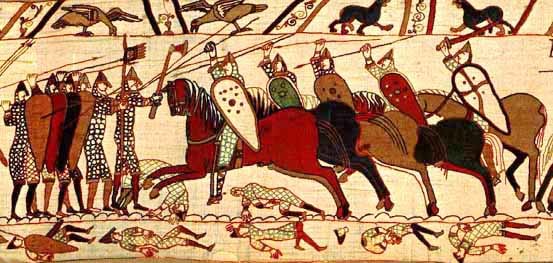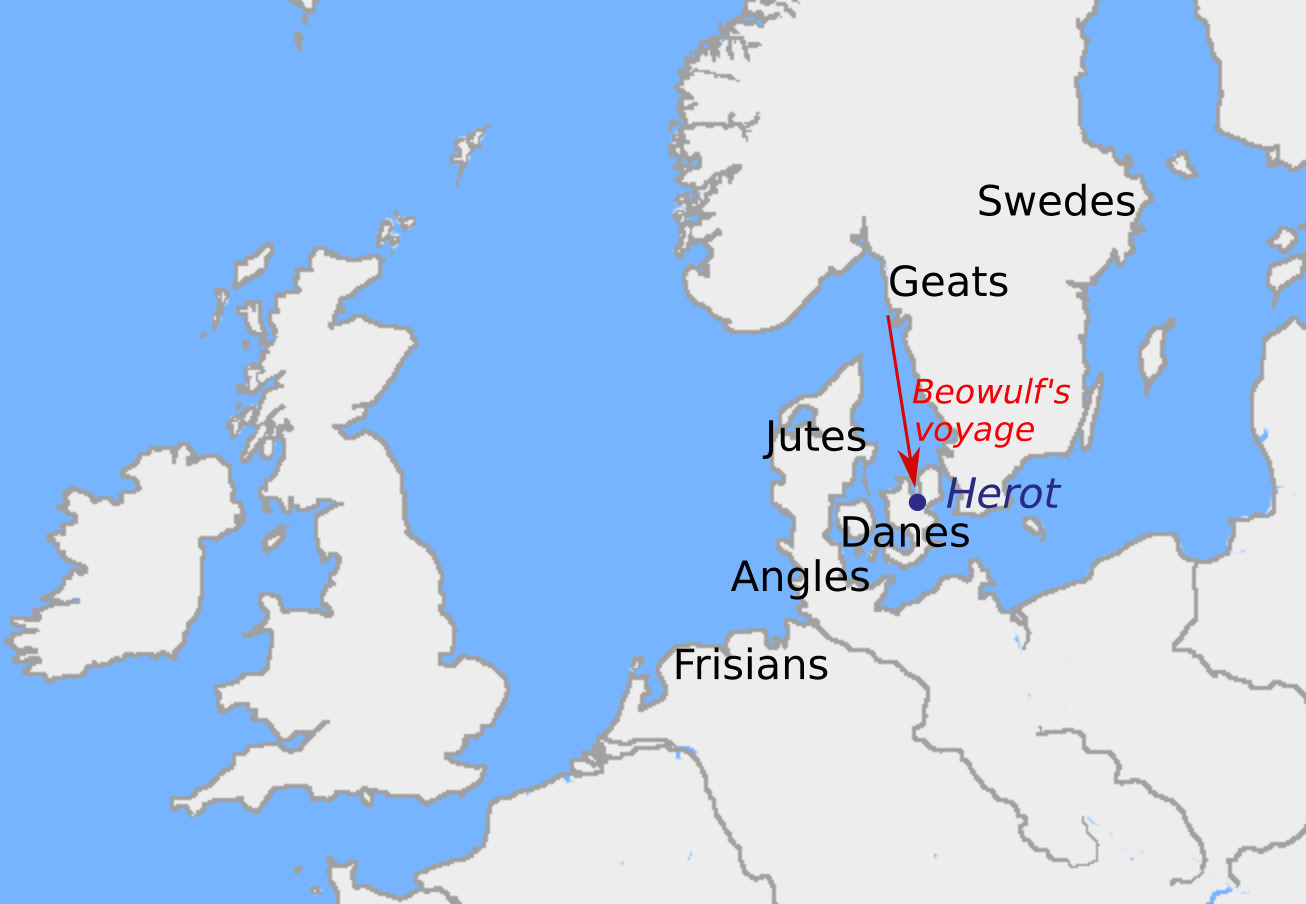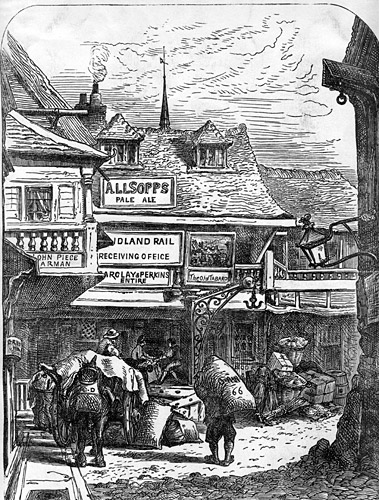Engelse taal en literatuur: Literatuurgeschiedenis (Middeleeuwen)
History of the English language
There were multiple varieties of the English language throughout history:
- Proto-English: 0th-5th century
- Old English (also known as Anglo-Saxon): 5th-12th century
- Middle English: 12th- 16th century
Old English
Old English was heavily influenced by 2 invasions/settlements:
- The Anglo-Saxon invasions (around the year 400) by 3 tribes from North Europe: The Saxons, the Jutes and the Angles.
- The Viking invasions (around the year 800) brought about many new words (such as [sk-] sounds: skill, sky, …) and new grammar (such as them/their/they).
Old English displaced (verdrong) 2 languages that were spoken at the time on the British Isles: Britannic Celtic and Latin.
Middle English
Middle English was mainly influenced by the Norman Conquest of 1066.

Dan Koehl, CC BY-SA 3.0, via Wikimedia Commons
This image, depicting the Battle of Hastings (one of the most important battles during the Norman Conquest), is from the Bayeux Tapestry, which is a very cool 70(!!!) meter long embroidered cloth depicting all kinds of events around the Norman Conquest.
During the Norman Conquest, thousands of Norman, French, Flemish and Breton soldiers invaded big parts of the British Isles.
After this conquest, many kings and other high-ranking nobles spoke Anglo-Norman (French).
With the addition of Anglo-Norman, there were 4 languages used on the British Isles:
- (Middle) English: used for daily life
- Anglo-Norman (French): used in government, law, church
- Celtic: used by original locals in Scotland, Ireland and Wales
- Latin: used for learning, science, history
The increasing use of (Middle) English was caused by 2 factors: intermarriage between people with different languages and by the invention of the printing press (allowing for much quicker communication).
Medieval literature
Beowulf
Beowulf is an epic: a long narrative (voorgelezen) poem. The most important characteristics of an epic are:
- It’s about a hero
- The setting is grand
- The hero does good deeds
- The hero goes on adventure
- The story starts in the middle
- The story includes supernatural elements
Beowulf is one of the most important works of Old English literature. The story is set in Scandinavia in the 5th and 6th centuries.

There are elements of 2 different religions in Beowulf:
- Christian elements:
Such as God, humility, and trust in divine providence - Pagan elements
Such as extraordinary strength, courage, and fatePaganism (heidendom) is the term used to describe people in the Roman Empire with a polytheistic (multiple gods) religions
Literary terms
| Term | Definition |
|---|---|
| Kenning | Term that describes a noun in a metaphorical and figurative way, e.g., “Big rock” for mountain |
| Tone | Feeling/attitude of the author/story |
| Universal themes | Ideas/messages that can be found in stories from all over the world and that apply to everyone |
| Setting | Where and when |
| Plot | The complete sequence of events in the entire story |
| Alliteration | Repetition of a letter or sound |
Summary
Fun fact: the first word in Beowulf (“hwæt”) doesn’t actually have a perfect translation. For a long time, historians thought it was kind of an interjection to grab the reader’s attention. That’s why it was often translated as “hear me,” “listen,” or “indeed.” But this theory is quite debated, so there are also other translations of hwæt, and seriously, this translation went with “bro”.
Hrothgar is the current king of the Danes. He built a great mead hall (mead is a drink made from honey) named Herod.
In the night, when all Hrothgar’s men are asleep, the monster Grendel kills a few of them, because he can’t stand the celebrations in Herot. He has done this for 12 years. The Danes try everything, but they can’t get rid of him.
When Beowulf (“the strongest of the Geats”) heard about Grendel, he decided to help Hrothgar. He goes to Denmark with 14 men.
When they arrive at Herot Beowulf leaves a few of his warriors outside. Then he and the rest take off their weapons and enter Herot to speak with King Hrothgar. Beowulf brags about his experience and strength and asks King Hrothgar for permission to fight Grendel all by himself. Hrothgar invites Beowulf to a feast in his honor, where Danes and Geats celebrate together.
During the meal, Unferth (Ecglaf’s son) tells a story about a swimming match between Beowulf and Brecca. Beowulf lost this match against Brecca. He does this because he is jealous of Beowulf and tries to intimidate him.
Beowulf replies by telling Unferth he’s drunk (he is) and that his story is incorrect. Beowulf did indeed lose, but that’s because he had to fight underwater monsters (and won), and Brecca did not. Then Beowulf exposes that Unferth killed his own brothers.
All men go to sleep. In the night, Grendel visits Herot again. He kills one of the Geats. He then tries to kill Beowulf, but he’s actually awake, and he fights Grendel with his bare hands.
The other Geats wake up and try to hurt Grendel, but they can’t hurt him with their swords, because he had bewitched the swords.
Beowulf rips off Grendel’s arm, and Grendel escapes, but his bleeds to death in his swamp. Beowulf hangs Grendel’s arm from the ceiling of Herot and everyone is happy.
Some warriors trace Grendel’s blood traces to find out that he had died in a lake.
Grendel’s mother attacks Herot because of her grief for her son. She kills one man (Hrothgar’s closest friend), and she takes Grendel’s arm with her. Beowulf is awakened and asked to help. Beowulf goes to the lake where Grendel’s mother lives. He takes the sword called Hrunting with him.
Beowulf dives in and then sinks for hours. Grendel’s mother tries to kill Beowulf, but his chain mail (maliënkolder) armor saves him. She has taken Beowulf to an underwater battle hall, and other monsters are looking at the fight. Beowulf tries to hit her with his sword, but her skin is just as bewitched as Grendel’s was. She bites holes in his helmet, which then breaks. Beowulf threw Grendel’s mother on the floor, but she quickly gets up, and she tries to kill him with a dagger, but the chain mail saves him once again.
Then Beowulf saw a heavy sword hanging on the wall. He grabs it, and he chops her head off. He does the same thing to Grendel’s body (which was there in the lake).
50 years later, Beowulf has to fight a dragon. The dragon is angry because a thief stole a jeweled cup, and Beowulf needs to protect his people. Beowulf and some other Geats go into the tower where the dragon lives. The dragon is mad and shoots flames at him, but Beowulf uses his shield, but the shield melts. He stabs the dragon with his sword, but the weapon breaks before it could do much damage.
All the warriors run away, except Wiglaf. Wiglaf is thankful for everything Beowulf has given him and wants to repay his king, so he helps him. Together they beat the dragon, but Beowulf dies.
Just before he dies, he makes Wigaf his successor, and he asks to be buried next to the dragon’s tower.
After he dies, Wiglaf is furious at the warriors that ran away. The story ends with the 12 bravest Geats riding around the tower and mourning over Beowulf.
The Canterbury Tales
The Canterbury Tales, written by Geoffrey Chaucer, is one of the most important works of Middle English literature. It is a collection of tales told in a frame narrative.
The story is set in the Tabard Inn (near London) in April. A group of pilgrims is preparing a journey to Canterbury. Chaucer himself, so he is both narrator and participant, introduces all the pilgrims, and he joins them on their journey.

The Tabard Inn in the 19th century
The society was divided into 3 classes: the clergy (church people), nobility (noble people), and the people (the tax-paying citizens).
Chaucer also uses satire to mock people from all social classes.
Summary
This will just be a list of all the characters that appear in the General Prologue, their stereotype (positive or negative), the social class, and a description
| Character (name) | Stereotype | Social class | Description |
|---|---|---|---|
| Knight | Positive | Nobility | Heroic, humble, modest, strong, wise, old discolored clothes |
| Squire | Positive | Nobility | Son of the Knight Strong, lively/joyful (reads, writes songs), strong |
| Yeoman | Positive | People | Servant of the Knight Faithful, loads of weapons |
| Prioress (Madame Eglantine) | Negative | Clergy | Head of the nuns Really obsessed with love (which nuns shouldn’t be), posh, dignified Chaucer is quite sarcastic when talking about her |
| Monk | Negative | Clergy | Handsome, doesn’t follow strict lifestyle, prefers good living and drinking (which monks shouldn’t) |
| Friar (Hubert) | Negative | Clergy | A poor religious person whose job it is to collect money/food Gossips, only helps the rich people |
| Merchant | Negative | People | Very good at business, maybe in debt? |
| Clerk | Negative | Clergy | Very smart, well-educated, but he also didn’t really progress even though he is so smart, poor |
| Sergeant of the law | Negative | People | Lawyer Smart, takes bribes, “dressed in the robes of authority” |
| Franklin | Positive | People | Cheerful, landowner, takes good care of others |
| Cook | Positive/negative | People | Makes good food, but is unhygienic |
| Shipman | Negative | People | Good at navigating, steals from the ship’s cargo |
| Doctor of Physic | Negative | Nobility | He is a great doctor, but he uses outdated/old-fashioned techniques, astronomer, greedy |
| Wife of Bath | Negative | People | Very good at making clothes, proud, arrogant, many affairs, wears fancy expensive clothes |
| Parson | Positive | Clergy | Poor but wise, patient, not greedy, not disrespectful to sinners |
| Ploughman | Positive | People | Brother of the parson Good worker, treats everyone nice, even though his life is hard |
| Miller | Negative | People | Ugly, strong but stupid, dirty, dishonest |
| Manciple | Positive | People | Business person Very wise, he outsmarted people |
| Reeve | Negative | People | Greedy, corrupt, good estate manager |
| Summoner | Negative | Clergy | Very ugly, alcoholic, children are afraid of him, pretends to be smart |
| Pardoner | Negative | Clergy | Arrogant, not manly, greedy |
| Host | Positive | People | Joyful, well-educated, good host |